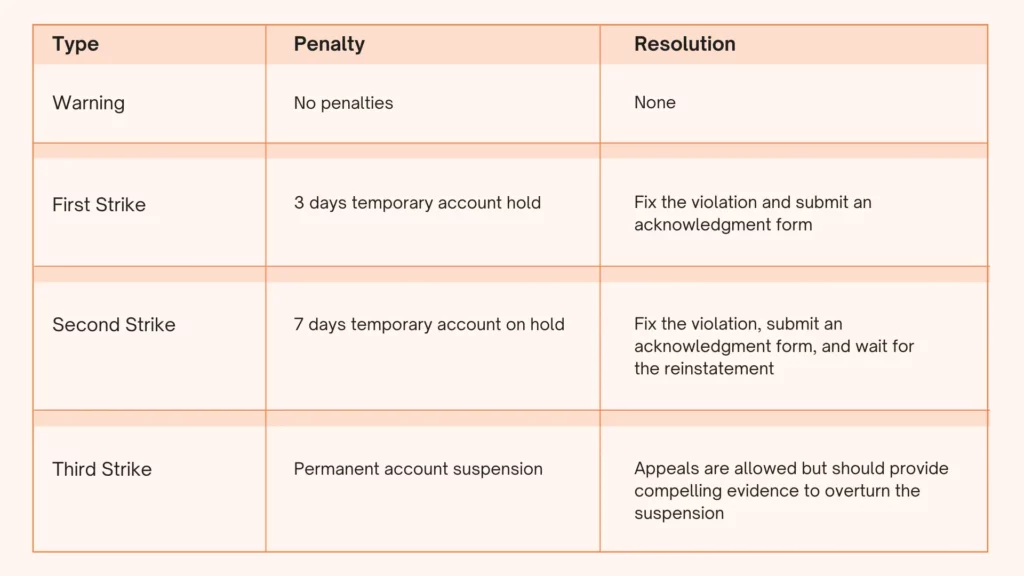
Google Strike-Based System for Ads Policies Violators
Google announced a new strike-based system targeting third-party advertisers who repeatedly violate Google Ads policies. Among the consequences include loss of privileges, removal from third-party programs, and account suspension.
This enforcement mechanism is designed to keep advertising spaces safe and trustworthy for all users. So, if you’re using Google Ads to promote your business, it’s essential to know the standards and learn how to stay compliant.

Source: Google.
Understanding Google Ads Strike Policy
Google’s strike-based system is a tiered approach that addresses ad policy violations. It imposes temporary penalties, and account suspensions for repeat offenders. In September 2021, ad policy violations included the following:
- Enabling dishonest behavior;
- Promoting unapproved substances;
- Guns, gun parts, and related products;
- Explosives and other weapons, and
- Tobacco.
In June 2022, Google updated the list of the following policies to include:
- Compensated sexual acts
- Mail-order brides
- Clickbait
- Misleading ad design
- Bail bond services
- Call directories, forwarding services
- Credit repair services
- Binary options
- Personal loans
As Google expands this system, it will notify advertising experts before introducing new policies within its scope. Google also emphasized that this policy update will not affect the existing account suspension procedures for egregious ad policy violations.
Egregious violations — such as extremely serious and unlawful acts that pose grievous harm to online users — will lead to immediate account suspension without prior warning.
These are considered to be egregious:
- Circumventing systems;
- Coordinated deceptive practices;
- Counterfeit goods;
- Promotion of unauthorized pharmacies;
- Unacceptable business practices, and
- Trade sanctions violations.
Achieve Success with PPC Management Specialists!
How Google Detects Policy Violations
Google uses automated tools and human evaluation to identify policy breaches. These systems analyze the following:
- Ad content and account behavior;
- Consumer reviews and user complaints, and
- Regulatory warnings and legal rulings.
Thus, proactively auditing your ad campaign can help you avoid violations and ensure compliance with Google Ads policies.
Penalties
Google Ads enforcement system will issue strikes to advertisers who violate their ad policies. These strikes will come with in-account and email alerts, reminding online advertisers to follow ad policies to continue promoting their businesses on Google.
Here are the penalties when you violate Google Ads policies:

Strikes remain for 90 days unless successfully appealed. But, accounts left unresolved stay on hold indefinitely.
Steps to Resolve Strikes or Appeal
If you happen to receive an email alert from Google containing ad policy violations, consider following these steps.
Acknowledging Violations
1. Resolve the issue causing the violation.
2. Submit an acknowledgment form confirming you’ve addressed the problem.
3. Wait for the temporary hold to lift based on the strike level.
Filing an Appeal
If you think the strike was an error, file an appeal using these steps:
1. File an appeal via a Google Ads account.
2. Google will review your case, including the evidence you submitted.
3. Once the appeal is approved, the strike will be lifted and your account will be reinstated.
5 Essential Tips to Avoid Google Advertising Policy Violations
Google’s strike-based system aims to enhance user safety and advertiser accountability. By enforcing stricter penalties for repeat offenders, Google ensures that its platform remains trustworthy for both advertisers and consumers.
Here’s a detailed guide to keep your campaigns running seamlessly:
Stay Updated on Google Ad Policies
Google regularly updates its policies to new regulations and user safety standards. Therefore, it’s vital to review their policy more often and subscribe to email updates. As a result, you can adjust your campaigns to align with the new requirements.
Perform Regular Campaign Audits
Reviewing your campaigns also helps you identify and address potential issues early on. So, focus on ensuring your headlines, descriptions, and visuals comply with the guidelines.
Moreover, consider verifying that your landing pages are secure, free from malware, and accurately represent your offer.
Leverage Google’s Compliance Tools
Google provides several built-in tools to help you ensure compliance, so take advantage of them. Consider incorporating the following into your campaign workflow:
- Policy Manager for tracking violations and appeals.
- Policy Troubleshooter for pinpointing specific policy issues in your campaign.
- Ad Approval Reports for identifying and addressing disapproved ads.
Use Transparent Advertising Practices
Transparency is vital to avoid misleading users or policy violations. Thus, it’s critical to display accurate pricing and product details and avoid making unverified or exaggerated claims. It’s also important to ensure your Call-to-Actions (CTAs) align with your offer and don’t mislead users.
Respond Quickly to Violations or Strikes
If Google issues a strike or disapproves your ads, resolve issues promptly or appeal for errors with supporting evidence. Quick action prevents further consequences and shows Google your commitment to ad compliance.
Key Takeaways for Online Advertisers
Staying compliant with Google Advertising policies is critical for running successful campaigns. To achieve this, businesses can follow the guidelines and consult expert PPC campaign management services to ensure everything runs smoothly and effectively.
Keep refining your strategies to avoid penalties and maximize the potential of your ad campaigns!
This blog was updated on November 28, 2024.
Frequently Asked Questions About Google Advertising Strike Policy
How often does Google update its policies?
Google updates its ad policies regularly, often multiple times a year, to align with changing laws, technologies, and user safety standards. The latest announcement was issued in November 2024.
What happens to ad performance metrics during temporary account holds?
Ads stop running during temporary holds. As a result, this also halts impressions, clicks, and conversions, negatively affecting performance metrics.
Are there specific third-party tools recommended for monitoring compliance with Google Ads policies?
Yes. One of the most efficient tools is Semrush, to help monitor ad compliance and optimize your campaigns. Many paid advertisers utilize other tools, such as Wordstream, AdEspresso, and Optmyzr.



















Comment 0